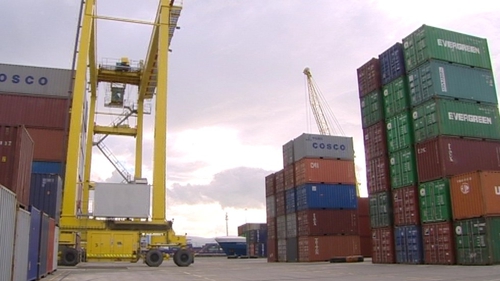
UK could face ECJ if it fails to apply Irish protocol
by Tony Connelly, https://www.facebook.com/rtenews/The UK can be brought to the European Court of Justice if it fails to carry out checks and controls on goods going from Great Britain to Northern Ireland, EU sources have confirmed.
Amid emerging differences over how the Irish Protocol will operate, sources say Article 12 of the Protocol gives the EU the power to take infringement proceedings against the UK through the ECJ.
Recent statements by prime minister Boris Johnson and Foreign Secretary Dominic Raab, that no checks or controls will apply on consignments of goods crossing the Irish Sea, have raised concerns on the EU side over the UK's commitment to the Protocol.
Echoing those statements, the new Secretary of State for Northern Ireland, Brandon Lewis today said that there would be no border in the Irish Sea.
Earlier this month, Mr Raab said claims that there would be checks and controls were "directly in conflict, not just with the Withdrawal Agreement but the undertakings in the political declaration [setting out the two sides' future relationship]."
Michel Barnier, the EU’s chief negotiator, and Ursula von der Leyen, have made it clear that checks and controls will apply when the transition period comes to an end by 31 December.
Concern has also been raised in Brussels at a promise by the British government in the New Decade, New Approach document, which helped restore the Northern Ireland Assembly and Executive.
In the document, the UK government states: "We will aim to negotiate with the European Union additional flexibilities and sensible practical measures across all aspects of the Protocol that are supported by business groups in Northern Ireland and maximise the free flow of trade."
EU sources have said that the means of implementing the Protocol have been agreed, and are now legally binding.
An internal document, seen by RTÉ News and circulated to member states, makes it clear the EU will take a strict line on the Protocol.
The Protocol will be implemented by the Joint Committee, comprised of EU Commissioners on one side and British ministers on the other.
Because the EU's external border will effectively be Northern Ireland’s ports and airports, and not the land border, the Protocol requires goods coming from Great Britain to Northern Ireland to be subject to tariffs, and customs controls, as well as regulatory checks at the point of entry.
While the Joint Committee will work out a schedule of goods and categories of goods which will be exempt from tariffs, because both sides agree there is no risk of them crossing the land border into the single market, EU sources insist there is no scope for the Joint Committee to negotiate away the need for checks and controls in the first place.
It’s understood the EU will operate from a baseline that every good will be subject in principle to checks and controls, and the only role the Joint Committee will have is to decide where the tariff exemptions fall, and that it has no discretion to whittle down the degree of control and the level of paperwork.
If the Joint Committee cannot reach agreement on tariff exemptions, then the default by the end of the year will be the trading relationship that prevails between the EU and UK.
If the UK and EU reach a zero-tariff, zero-quota free trade agreement by the end of the year then that will remove the need for tariffs.
However, if they fail then tariffs and quotes could well apply, and in that scenario there would be no exemptions for goods going to Northern Ireland, unless a schedule of exemptions was agreed a priori by the Joint Committee.
Last October Boris Johnson effectively agreed that there would not be a customs border on the island of Ireland. As a result, there will be a regulatory and customs border on the Irish Sea.
The internal document circulated to capitals describes the Irish Protocol as "a fully legally operative solution for Northern Ireland…to remain in the UK’s customs territory" but one in which Northern Ireland would "apply the [European] Union’s Customs Code (UCC), as well as checks and controls, on all goods coming from third countries as well as from Great Britain…"
The document said Northern Ireland would "remain aligned to the relevant EU rules (customs, sanitary and phytosanitary rules, regulatory compliance, state aid, VAT and excise rules)."
The Joint Committee will be accompanied by a six Specialised Committees dealing with the key problem areas of the divorce, such as the financial settlement, citizens’ rights, Gibraltar and the Irish border.
One Specialised Committee, made up of officials from both sides, will deal specifically with Ireland, but only the Joint Committee will be able to make decisions.
While the European Commission will represent member states on the overall Joint Committee, the paper confirms that the Irish government "may request to accompany the Commission in the respective specialised committee…"
RTÉ News understands that if the UK does not put in place a checking regime or if it fails to carry out the correct checks and controls then the EU can take infringement action, potentially leading to the European Court of Justice.
Article 12 (4) of the Protocol states: "In particular, the Court of Justice of the European Union shall have the jurisdiction provided for in the Treaties" in respect of how checks and controls are applied.